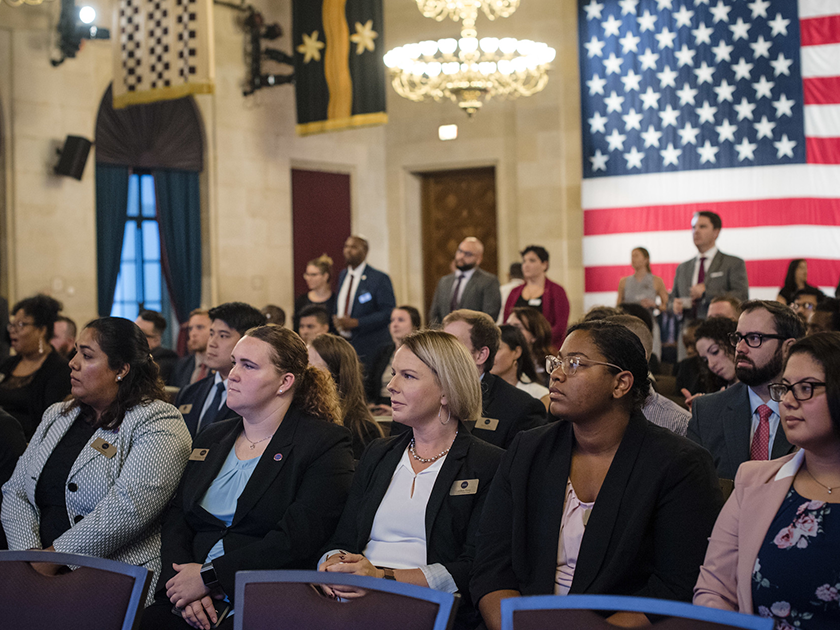
Final Bills of the 116th Congress
Shortly before adjourning the 116th Congress, a massive government funding and pandemic relief bill as well as at the National Defense Authorization Act cleared Congress just in time to ring in 2021. Some of the most important items for student veterans, service members, and their families are outlined below.
Pandemic Relief
$23 Billion in Relief Aid for Students and Schools – Schools will receive $23 billion in relief funds to help them meet the challenges of COVID-19. Of the amount they eventually receive, colleges will be required to use roughly the same amount of funding as they did under the CARES Act to provide additional emergency aid grants to students.
Temporary Expansion of SNAP for College Students – College students may temporarily qualify for Supplemental Nutrition Assistance Program (SNAP) if they are eligible to participate in a federal or state work study program or have an expected family contribution of 0.
$600 Direct Payments – Non-dependent students will receive up to $600 in direct payments from the federal government if they make up to $75,000 per year. Married couples making up to 150,000 will receive checks for up to $1,200. $600 will also be paid to parents for each dependent child. Payments decrease by $5 for every $100 an individual or couple exceeds the $75,000 and $150,000 thresholds respectively. Individuals making over $87,000 and couples making more than $174,000 are not eligible for these direct payments.
Childcare Assistance – Provides roughly $10 billion in emergency assistance for childcare providers to help them remain open or reopen through the pandemic.
Unemployment Assistance – Extends certain unemployment relief from the CARES Act, including Pandemic Unemployment Assistance (PUA) and Pandemic Emergency Unemployment Compensation (PEUC). Provides individuals $300 per week through the Federal Pandemic Unemployment Compensation (FPUC) program on top of existing federal and state unemployment benefits. You can find additional information on pandemic-related unemployment insurance here.
Emergency Broadband Assistance – Provides $3.2 billion to help low-income families access broadband internet through an FCC program. Funds and establishes several grants and programs to reduce barriers to broadband access. Establishes an office of Minority Broadband Initiatives to expand broadband access in certain minority communities near historically black colleges or universities, tribal colleges or universities, and minority-serving institutions.
Rental Assistance – Extends the CDC rental eviction moratorium through January 31, 2021. Establishes a new program to help low-income Americans pay rent, past due rent, energy, and utility costs during the pandemic.
Department of Education Provisions
VA Benefits Removed from FAFSA Calculus – Veterans’ benefits like disability compensation and survivor benefits will no longer count against veterans and their family members when submitting a Free Application for Student Aid (FAFSA), potentially allowing these students to qualify for more Federal Student Aid.
FAFSA Simplified – The FAFSA has been simplified by reducing the total number of questions from 108 to 36.
Access to Pell Grants Expanded – About 1.7 million more students will be eligible for maximum Pell Grant awards and nearly 500 million additional students will be eligible for at least the minimum award. Expanded access is based on a new, more generous financial need formula and restoration of eligibility for incarcerated students and those with drug convictions.
Pell Grant Maximum Award Increased – The maximum Pell Grant will be increased by $150 to $6,495.
Unemployment Insurance Lack of Income Assumption – To help them qualify more easily for Pell Grants, students applying for Federal Student Aid are assumed to have no income if they received unemployment insurance during a national emergency.
Extends Employer Student Loan Program – The CARES Act program that allowed employers to contribute up to $5,250 tax-free toward employee student loans has been extended.
Federal Work Study – An additional $10 million was provided to fund the Department of Education’s Federal Work Study program.
Childcare Access – An additional $2 million was provided to fund the Child Care Access Means Parents in School Program, which is designed to support low-income students through campus-based childcare.
Department of Veterans Affairs Provisions
Pandemic Response and Ed. System Improvement Funds – Funds can be transferred within VA to help respond to COVID-19 issues and improve IT systems for education benefits.
National Defense Authorization Act (NDAA)
Reserve Loan Repayment Program Increase – The maximum amount the Department of Defense (DoD) will repay for each qualifying student loan for members of the Selected Reserve was increased from $500 to $1,000.
Skillbridge for Coast Guard – Members of the Coast Guard are now eligible to participate in the DoD Skillbridge Program, which helps transitioning service members learn the skills they need to participate in the workforce.
JROTC STEM Grants – Provides grants to institutions to help Junior Reserve Officers’ Training Corps (JROTC) students receive STEM education.
SMART Program Diversity Measures – Authorizes actions including increased financial assistance for students at historically black colleges or universities and minority-serving institutions, new partnerships, and increased awareness to diversify participation in the Science, Mathematics, and Research for Transformation (SMART) Defense Education Program.
SROTC and CSPI Diversity Measures – Includes two new pilot programs to address barriers to the Senior Reserve Officers’ Training Corps (SROTC) and the Coast Guard College Student Pre-Commissioning Initiative (CSPI) at historically black colleges and universities and minority-serving institutions that will include, among other things, access to financial assistance.
Expanded Access to Legal Assistance – Creates new pathways for eligible individuals to obtain free legal assistance at VA locations and through a new pilot program.
Financial Assistance for In-home Childcare – Establishes a pilot program that will provide financial assistance for service members to help cover the costs of in-home childcare services.
Expanded Coast Guard Childcare – Expands access to childcare for members of the Coast Guard through, among other things, a new pilot program and off-base family childcare facilities.